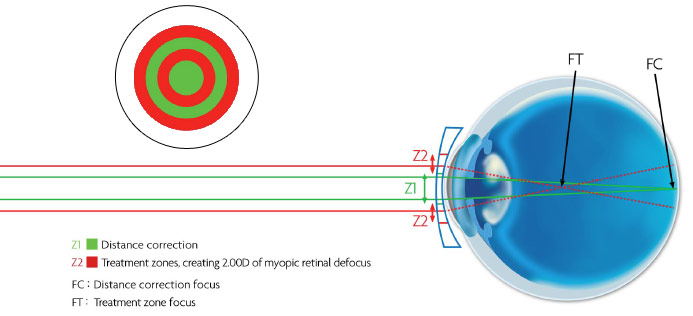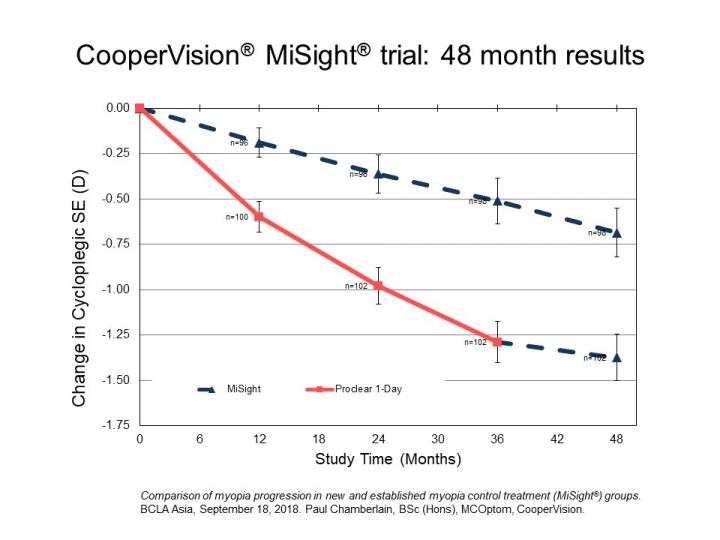
MiSight is a new daily disposable contact lens that has been proven to slow down the progression of myopia in children by 59% in a 4 year study done in a few countries. As a non-pharmaceutical option to control myopia, it is a very appealing tool for optometrist.
Currently, to control myopia progression, we have special spectacle lenses (progressives, bifocals, prismatic bifocals, myopic defocus), atropine as well as Ortho-K. The myopia control spectacle lenses will work for certain children who exhibit certain binocular vision anomalies such as convergence excess and accommodative lag. The effectiveness is also contingent on the glasses being well aligned and the child using it correctly.
Atropine treatment seems to work quite well for children especially in higher concentration but parents may be concerned with potential long-term side effects (not established as yet). It also may increase glare as the pupils will be dilated. There is also an associated rebound myopia upon sudden cessation of the drops.
Ortho-k works very well to control myopia but there is always a small but real risk of a bacterial infection. During the treatment period, the lenses must be worn regularly to maintain good vision and myopia control. In the event the child has to stop wearing these lenses, the myopia will creep back resulting in reduced vision during this period. The child has to wear glasses in the interim until lens wear is resumed. The prescription will fluctuate during this period.

MiSight presents another option for us to control myopia progression. It creates a retinal myopic defocus to prevent the eyeball from elongating by using alternating rings of corrective and treatment zone on the contact lens. In a multi-center, double masked 3 year study, kids wearing MiSight lenses shown a 59% reduction in the progression of myopia versus those on regular daily disposable lenses. At the end of the 3 year study, the control group was switched over to the MiSight lenses. At the end of the 4th year, they too exhibited a slow down in the progression of myopia.

This contact lens is only available in a daily disposable to reduce the risk of allergies and infection. MiSight disposable lens uses PC Technology. Phosphorylcholine (PC) molecules attract and bind water to the surface, creating a shield that keeps the lenses clean and functioning properly. The PC molecules also help the lenses remain hydrated, which in turn, help them feel moist and comfortable all day long.
Due to the unique rings of corrective and treatment zone, it will take a few days to get used to it. I have personally tried it on myself to test the vision and comfort, under room lighting images are clear with no physical nor visual discomfort. However, when I enter a dim room, I do notice a slight halo around light sources. The lens stayed comfortable in my eye till I finish work and reach back home.
For children with astigmatism, they will have to make a pair of glasses to correct the residual astigmatism as these lenses do not correct astigmatism. The children can then choose to do wear these glasses in class so that while the treatment is taking place, it does not disrupt their vision in school. As it is a treatment administered through contact lenses, the child has to wear the lenses for 6 days per week to have a good effect on the myopia progression.
This is indeed a very promising lens. It is a safe, comfortable and effective way to slow myopia progression in children. It can also be used in tandem with 0.01% atropine if the 0.01% atropine is not working well enough. The only drawback that foresee is the cost. A month supply costs $150. We look forward to offering this as another option alongside with the existing ones in the fight against myopia. Call or visit us now to understand more.
Patrick Ng Yao Min
Optometrist
Msc Clinical Optometry